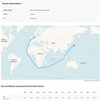Tankers Face Delays at China's Shandong as Customs Hold Up Mislabelled Cargoes
Tankers delivering to ports in China's Shandong province are facing delays discharging their oil due to orders for tighter customs inspection checks after several Iranian cargoes were declared as diluted bitumen, traders said.
Crude oil, unlike bitumen, is subject to strict import quotas and dozens of oil tankers were being inspected since last week, after customs authorities were given instructions in late March to step up checks.
The delays at the terminals could cause further reductions in already low operating rates among the independent refiners in Shandong, which account for a fifth of China's crude oil imports.
The clampdown came after several shipments of diluted bitumen, a blend of heavy residue fuel used to produce road-paving bitumen, delivered to the northern port Tianjin were found to contain an unusually high amounts of lighter hydrocarbons that normally exist in crude, three of the traders said.
Oil tankers that have anchored off Shandong ports over the past week were asked to present documents detailing the specifications of the oil they are carrying and sample reports to prove it matches with the customs declaration, said five traders with knowledge of the matter.
Authorities have placed about 1.6 million barrels of oil in bonded tanks in Tianjin and Shandong, and are holding up several other shipments totalling about 8 million barrels from clearing customs,said two of the traders involved in bitumen feedstock trade.
It was unclear whether the cargoes would be released to their importers.
"Shandong began widening the checks after some local traders were found declaring crude oil as diluted bitumen," said a Shandong-based refinery trading manager.
Traders said most of these shipments that were seized or held up carry Iranian heavy crudes Pars Oil and Soroosh, both suitable for producing bitumen.
China's General Administration of Customs did not respond to requests for comment.
The Iranian grades, highly sought by refiners who are short of crude import quotas, have higher yields of diesel and gasoline than competing Venezuelan heavy crude Merey, a popular grade that has been marketed as bitumen feedstock.
Due to U.S. sanctions during the past three years, imports of Iranian oil have often been falsely declared as originating from producers like Oman, the United Arab Emirates or Malaysia as a way to circumvent scrutiny.
Emma Li, Vortexa's China analyst, said the inspections target shipments of oil with a density below 0.95.
"That has hindered Iranian Pars (density 0.916) and Soroosh (density 0.94) crude imports, as some teapot refiners turned to these heavily discounted bitumen-rich barrels in recent months," said Li. Bitumen mixtures have a density typically above 0.95.
Reduced supplies of competing Venezuelan oil early this year also spurred demand for Iranian crudes as Chinese bitumen consumption rebounded following Beijing's removal of COVID-19 controls, traders said.
(Reuters - Reporting by Chen Aizhu, Trixie Yap and Muyu Xu; Editing by Florence Tan and Simon Cameron-Moore)











